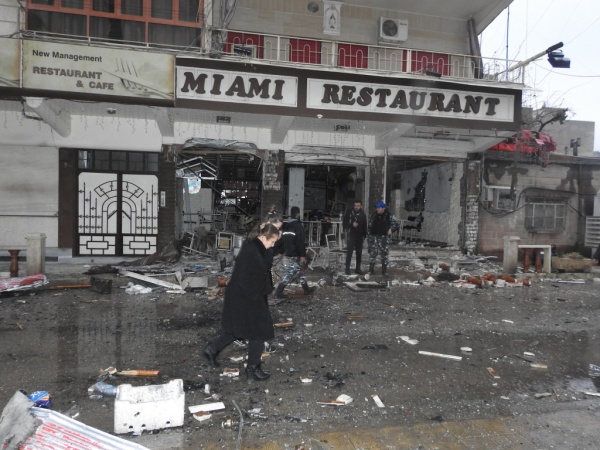Was it really ISIS?
Kategori: Identitet

Right after the bombing of two Assyrian restaurants in the Assyrian quarter Wusta in Qamishly, Syria, on the evening of December 30, 2015, Reuters referred to the Kurdish YPG militia spokesman Redur Xelil. He called the attacks suicide bombings and blamed it on ISIS: "He said it had most likely been carried out by Islamic State, which the YPG is fighting in Syria's northeast". Xelil was not slow to exploit the opportunity by describing it as an attack on Kurds and Assyrians. YPG and its Dawronoye-puppet did the same thing right after the murder of David Jendo, and also promised to avenge his death. A few days later it turned out that the murder of David Jendo and Elias Nasser (who survived) was performed by leading figures in the YPG. At this writing, there is not as clear evidence regarding the attacks in Qamishly, but suspicion is in a different direction than ISIS.
Even the Syrian Orthodox Patriarch Aphrem II Karim and his Syrian Catholic colleague Joseph III Younan have issued statements condemning the massacre, but none of them mentions ISIS. Obviously, they are not convinced that the main candidate behind the attacks is ISIS. Patriarch Younan fears that the attacks will scare the remaining Christians in Gozarto and says: "Now, after this massacre, our fear is that the emigration of Christians will go further and in larger numbers". Patriarch Karim calls the perpetrators enemies of humanity: "The enemy of humanity is spreading its power everywhere in our beloved Middle East…”
No suicide bombings
Moreover, the attacks were not any suicide bombings, in the contrary to what YPG and various media reports allege. Some testimonies say that a guy who did not differ from the amount arrived at Café Miami and ordered a drink. He had a laptop bag with him. When he had gone, he left the bag under the table. Before anyone could react, the bag exploded and the devastation was total. Ten Assyrians, an employee Kurd and two other Muslims were killed. A large number were injured. Usually, the waiters in Qamishly are Kurdish. (Rumours say that a couple of the Kurdish employees at mentined café left their job shortly before the explosions and that the Assyrian guards Sootoro has interrogated them. But these are unconfirmed reports). Shortly thereafter a similar computer bag exploded outside the window of the restaurant Gabriel in the same neighbourhood. Three people were killed. Initially even a third explosion at another restaurant was mentioned, but there are no reliable reports of killed or injured. The details of what preceded the explosions are so far not confirmed. But all the witnesses denounce the rumour of suicide bombings.
The city of Qamishly was built by Assyrians who survived the genocide Seyfo, when Syria was a French protectorate. With time, it became an important centre of Assyrian culture and national awakening among the Assyrians. A large number of the Assyrian inhabitants left the city during the ongoing civil war and sought refuge in Sweden and other EU countries.
Motive
The first thing that an investigator usually does is to search for a possible motive behind a crime, by asking who may have the greatest interest in the crime output. Therefore we may now ask ourselves who benefits from the attacks in Qamishly. The testimonies of injured Assyrians and the statements by local Assyrian representatives clearly show that the purpose was to scare away "the disobedient" Assyrians from Gozarto region, whom refuse to accept any forced Kurdish rule. In a statement by Sootoro, which has also been uploaded in a video recording, it is said that "those who are our neighbours want to scare us, but we refuse to bend and will defend our city and our country". A leader of Gozarto Protection Forces (GPF) says to the American Mesopotamian Organization (AMO): “Although someone claiming to represent ISIS posted a message on social media taking responsibility for the bombs, the types of explosives and the nature of the attacks does not fit the ISIS pattern of violence”.
Which ethnic group is that "lives next door to us"? To my knowledge there are no IS-followers in Qamishly living neighbours with us. Considering recent developments, there is only one answer. But if we can get any evidence, that’s a question which remains unanswered for the moment.
